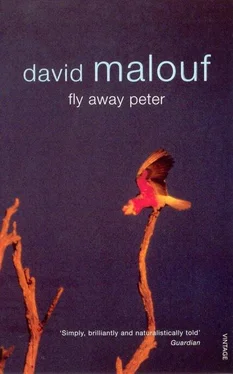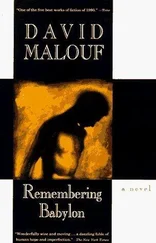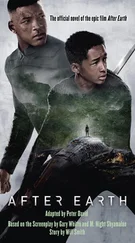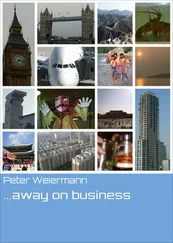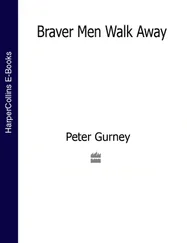‘What does it mean,’ Jim had wanted to ask, ‘the likes of us?’ Except for the accidental link of blood he saw nothing in common between his father and himself and resented the cowardly acceptance of defeat that made his father feel this change in his fortunes as a personal affront. But he had had enough cuffs from the old man, over lesser issues than this, to have learned that there were some questions that were better not put.
‘You’re a bloody fool,’ the old man told him, ‘if you trust that lot, with their fancy accents and their newfangled ideas. And their machines! You’d be better off gettin’ a job in Brisbane and be done with it. Better off, y’hear? Better!’ And he punched hard into the palm of his hand.
There was in his father a kind of savagery that Jim kept at arm’s length; not because he feared to be its victim in the physical sense — he had been often enough and it was nothing much, it was merely physical — but because he didn’t want to be infected. It was of a kind that could blast the world. It allowed nothing to exist under its breath without being blackened, torn up by the roots, slashed at, and shown when ripped apart to have a centre as rotten as itself. His father had had a hard life, but that didn’t explain it. ‘I was sent out to work at ten years old by my old man. Put to the plough like a bloody animal. Sent to sleep in straw. All that, all that!’ But it didn’t account for what the man was. It had happened equally to others in those days; and besides, Jim might have argued, did you treat me any better? No, the baleful look his father turned on the world had no reason, it simply was.
He swallowed his resentment and determined to say no more. As for Ashley Crowther, he would take the risk. Something in the silence that existed between them, when they just sat about on stumps and Ashley crossed his legs and rested his chin in the palm of his hand, made Jim believe there could be common ground between them, whatever the difference. There was in Ashley a quiet respect for things that Jim also respected.
None of this had to be stated. Ashley was too incoherent to have explained and Jim would have been embarrassed to hear it, but he understood. All this water, all these boughs and leaves and little clumps of tussocky grass that were such good nesting-places and feeding grounds belonged inviolably to the birds. The rights that could be granted to a man by the Crown, either for ninety-nine years or in perpetuity, were of another order and didn’t quite mean what they said. This strange man with his waistcoat and his watch-chain, his spotted silk tie and Pommie accent, had seen that from the start.
But there was more. There was also, on Ashley’s part, a recognition that Jim too had rights here, that these acres might also belong, though in another manner, to him. Such claims were ancient and deep. They lay in Jim’s knowledge of every blade of grass and drop of water in the swamp, of every bird’s foot that was set down there; in his having a vision of the place and the power to give that vision breath; in his having, most of all, the names for things and in that way possessing them. It went beyond mere convention or the law.
There was something here, Jim thought, that answered his unasked question, ‘what does it mean, the likes of us?’, by cancelling it out in some larger view, and it was this that he was prepared to trust. The view was Ashley’s and it was generous. It made a place for Jim, and left room as well for the coming and going of a thousand varieties, even the most alien, of birds.
ASHLEY CROWTHER HAD come home after more than twelve years to find himself less a stranger here than he expected.
He had been at school in England, then at Cambridge, then in Germany for a year studying music, and might have passed anywhere on that side of the world for an English gentleman. He spoke like one; he wore the clothes — he was much addicted to waistcoats and watch-chains, an affectation he might have to give up, he saw, in the new climate; he knew how to handle waiters, porters, commissionaires etc. with just the right mixture of authority, condescension and jolly good humour. He was in all ways cultivated, and his idleness, which is what people here would call it, gave him no qualms. He took a keen interest in social questions, and saw pretty clearly that in the coming years there would be much to be done, stands to be taken, forces to be resisted, changes to be made and come to terms with. The idea excited him. He approved of change. With all that to think of he didn’t see that one had also to have a vocation, a job named and paid for and endured for a certain number of hours each day, to be a serious person.
Ashley Crowther was a very serious person. He was dreamy, certainly, and excitably inarticulate, but he liked what was practical, what worked, and in the three years since he came of age had owned four automobiles. Now he was interested in the newest thing of all, the air. He didn’t fly himself, but his friend Bert did, and he was quite content, as in other cases, to play the patron and look on.
In the crude categories that had been in operation at Cambridge, athlete or aesthete, he had found himself willy-nilly among the latter. He had never been much good at games — his extreme thinness was against him — and he not only played the piano, Chopin and Brahms, but could whistle all the Leitmotifs from The Ring. But his childhood had been spent in the open, he had never lost his pleasure in wide spaces and distant horizons, in climbing, riding, going on picnics, and the creatures he had been surrounded by in those early years had never deserted his dreams. Moving as they did in the other half of the world, far under the actualities of the daylight one, they had retained their primitive power and kept him in touch with a continent he had been sent away from at eleven but never quite left. Perhaps that is why when he came back at twenty-three he was not a stranger.
Waking up that first morning in the old house — not in his own room, the room of his childhood, but in the big main bedroom since he was now the master — he had been overwhelmed by the familiarity of things: the touch of the air on his skin — too warm; the sharpness of the light even at twenty to seven — it might have been noon elsewhere; above all, since it is what came closest to the centre of his being, the great all-embracing sound that rose from the dazzling earth, a layered music, dense but deeply flowing, that was clippered insects rubbing their legs together, bird-notes, grass-stems chaffing and fretting in the breeze. It immediately took him up and carried him back. He stepped out on to the verandah in his pyjamas — no need for even the lightest gown — and it was all about him, the whole scene trembled upon it. The flat earth had been transposed into another form and made accessible to a different sense. An expansive monotone, its excited fluting and throbbing and booming from distended throats had been the ground-bass, he saw, of every music he had ever known. It was the sound his whole being moved to. He stood barefoot on the gritty boards and let it fill his ear.
‘How can you do it?’ his friends back there had said, commiserating but admiring his courage, which they altogether exaggerated.
‘It’s my fate,’ he had replied.
The phrase pleased him. It sounded solemn and final. But he was glad just the same to discover, now he was here, that he was not a stranger, and to feel, looking out on all this, the contentment of ownership and continuity.
It was his grandfather who had taken up the claim and put his name to the deeds; but he had died while the land was still wild in his head, a notion, no more, of what he had staked out in a strange and foreign continent that his children must make real. Ashley’s father had created most of what lay before him. Now it was his.
Читать дальше
